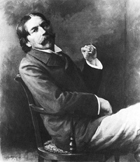A Brief History of the ITVA
The International Thorstein Veblen Association is an organization of scholars from a number of countries, whose work embraces multiple aspects of Veblen's intellectual contribution, the various influences on his thinking, his biography as a Norwegian American, the implications of Veblenian theory for analyses of contemporary life, as well as his enduring intellectual influence in fields as diverse as economics, sociology, political science, anthropology, history, and literary criticism, among others. ITVA owes its original impetus and organization to the dedication of our founder, the late Arthur J. Vidich, Professor Emeritus of Sociology at the New School for Social Research in New York City.
Professor Vidich related personally to Veblen the man and to his intellectual legacy and in retirement felt moved to honor Veblen's memory by promoting a reconsidering his life's work. Vidich was especially keen to encourage careful re-examination of Veblen's biography. This work has resulted in a substantial revision of the familiar image of Veblen as a "marginal man," a view popularized by Joseph Dorfman's much flawed, but still useful 1934 biography, Thorstein Veblen and His America. Professor Vidich's interest in encouraging a new look at Veblen's relevance to understandings of contemporary life was further stimulated by the historic collapse of the former socialist bloc. Its initial implications for an unstable new global order, Vidich felt, invited a reexamination of the claims and insights of Veblenian social science. In particular, Veblen's theory of business enterprise and finance, the internationalization of trade and technical progress, his consideration of the enduring influence of imperial and aggressive tendencies in the world order, and his insistence on never underestimating the continuing power of conservative institutions, especially religion, made his work as relevant to the main drift of twenty-first century, as it was prescient about the most horrific trends of the twentieth.
To help spur his new institution into being, Vidich called upon a distinguished group of Veblen scholars, including John Diggins, Clare Eby, Franco Ferrarotti and Rick Tilman, to serve as the organization's Board of Directors and as boosters for ITVA's inaugural conference, hosted by the New School on 4-5 February 1994, an institution Veblen helped to found after World War One, in part as a refuge for European scholars dislocated by the war. The meeting attracted scholars from across the U.S. as well as from Australia, Denmark, England, Germany and Italy. Papers examined recent Veblen scholarship; Veblen's views on women, race, education, and culture; his concept of instinct in human conduct; his personal values; his place in literature, as well as his relevance to current economic theory.
The second ITVA conference was organized largely by Rick Tilman (University of Nevada, Las Vegas) and held from 30 May to 1 June 1996 at Veblen's undergraduate alma mater, Carleton College in Northfield, MN. The geographic distribution of participating scholars remained broad, with additional participants from Finland, Japan and the Netherlands. A full program of panels was supplemented with a well-attended excursion to the Veblen farmstead in Nerstrand, as well as to the Veblen family cemetery plots at nearby Spring Grove. It was also agreed at this meeting to make the Carleton College Archives the official repository for ITVA records and papers.
Clare Eby (University of Connecticut-Hartford) and Arthur Vidich organized the third ITVA conference at the New School, 17-18 April 1999, in celebration of the centenary of Veblen's hallmark work, The Theory of the Leisure Class. Participants came from eleven states and the District of Columbia, as well as from Canada, England, Finland, Germany, Italy, and the Netherlands.
Originally scheduled to be hosted by Carleton College in the spring of 2001, the fourth ITVA conference was postponed for a year, then held at the New School on 11-12 May 2002, organized by Michael Hughey (Moorhead State University) and Arthur Vidich. One of the salient panels reviewed and critiqued Stephen Edgell's new book, Veblen in Perspective: His Life and Thought (M.E. Sharpe, 2001). Renewed attention was given to deconstructing the work of Joseph Dorfman, the influential author of the chief, but deeply flawed biography of Veblen, Thorstein Veblen and his America (Viking Press, 1934)
Looking ahead to the ITVA's tenth anniversary meeting, the members decided at the 2002 meetings to divide up ITVA's expanding organizational responsibilities, with newly elected ITVA president Sidney Plotkin (Vassar College) overseeing program development for future conferences and Russell and Sylvia Bartley (Noyo Hill House, Fort Bragg, CA) coordinating local arrangements. It was also agreed to hold this anniversary meeting at Carleton College, June 3-6, 2004, where the papers ranged across such topics as Veblen's theory of action, the critical analysis of war, his study of the American business cycle, the moral dimensions of Veblenian thought, the Veblen family in Wisconsin, and a view of Veblen from the standpoint of his students' notes. In addition, a special panel celebrated the 100th anniversary of the publication of The Theory of Business Enterprise (Charles Scribner's, 1904). The group re-elected Sidney Plotkin and the Bartleys to continue on as organizers of the next ITVA meetings, at the New School University in New York City, March 22-24, 2007. Papers at this meeting offered assessments of such Veblen classics as Theory of the Leisure Class and The Instinct of Workmanship, reflections on Veblen's intellectual connections with Marx and Dewey, feminism and ecology, and included a roundtable on Veblen's relevance to globalization as well as a memorial roundtable on Art Vidich and his Contribution to Veblen Studies. The membership pledged to meet again in two years. Plans are now being made for ITVA's seventh conference to be at Carleton College, in early June 2009, and for the next one in 2011, to be held at the University of Missouri, at Columbia, where Veblen taught for 15 years.
